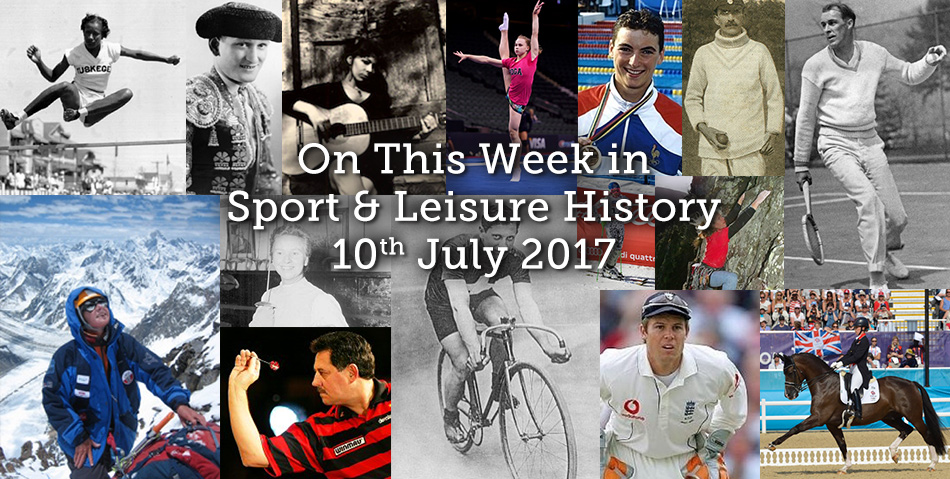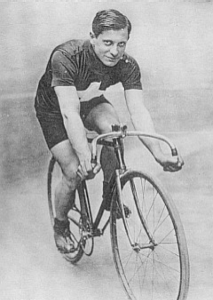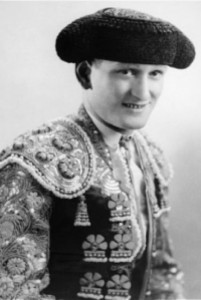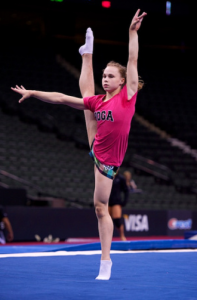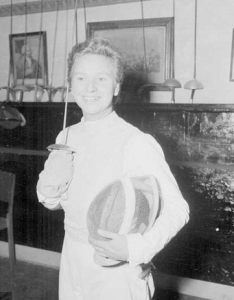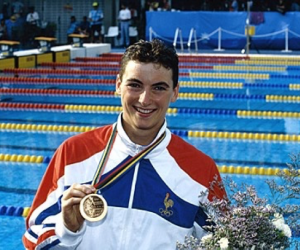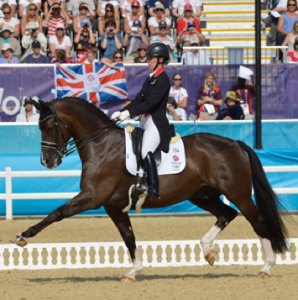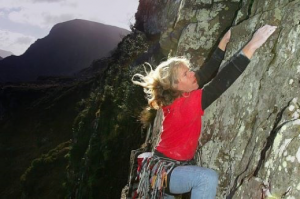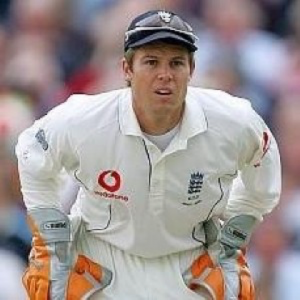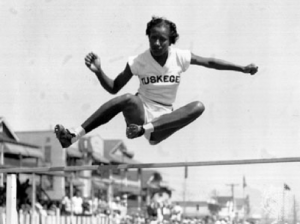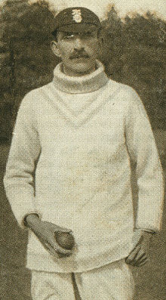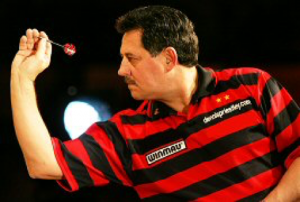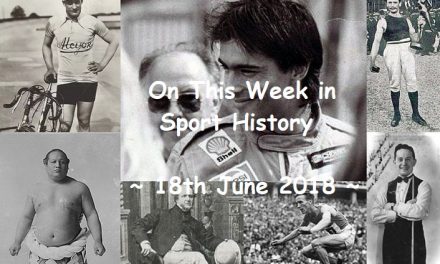10th – On this day in 1884, Old Trafford became the second English ground, after The Oval, to stage Test cricket, the first day was unfortunately washed out – England eventually drew the Test with Australia. Heiri Suter professional road racing cyclist from Switzerland was born in 1899. In 1923, he was first to win Paris–Roubaix and the Tour of Flanders in the same year and clocked up 58 professional wins in his career. The Jamaican sprinter Herb McKenley was born on this day in 1922. He competed at the 1948 and 1952 Olympics in six events in total, and won one gold and three silver medals. Having enrolled at the University of Illinois and won the NCAA championships in 220yd and 440yd in 1946 and 1947, he was also the AAU champion in the 440yd in 1945, 1947 and 1948, and was also the head of the list of world best times in 100m (10.3), 200m (20.4) and 400m (46.2) in 1947. He is the only person to ever have achieved this feat. Just before the 1948 London Olympics, McKenley ran the new world record in 440yd of 46.0, a record he broke again a month later, clocking 45.9. But at the Olympics McKenley finished only second in 400m, behind teammate Arthur Wint and was fourth in 200m. He probably lost a gold medal in the 4× 100 m relay when Wint pulled his muscle in the final. He is the only person to have made the final in all three sprinting events, the 100m, 200m and 400m in the Olympics. On 23rd August 1947, on a wind-aided straight at Long Branch, New Jersey, McKenley was timed in 45.0 for 440 yards, a claimant to being the first person to break the 45 second barrier at 400m. At the first 1951 Pan-American Games in Buenos Aires, McKenley was third in 100m, 200m and 400m, the only person to ever perform this feat. At the Helsinki Olympics, McKenley was second in 100m (the first four clocked 10.4 in a very close race) and also second in 400m. He finally got his Olympic gold, when he helped the Jamaican 4×400 m relay team to win the race with a new world record of 3.03.9. His remarkable 44.6 leg is credited with pulling Jamaica into contention. It is considered one of the greatest relay legs in history. After retiring from sports, McKenley was a coach of the Jamaican national team from 1954 to 1973 and served also as a president of Jamaica Amateur Athletics Association. For his contributions in track and field, he was awarded the Jamaican Order of Merit in 2004. Today in 1926 saw the 30th US Golf Open, which was won by Bobby Jones, shooting a 293 at the Scioto CC in Ohio. Moe Norman, the Canadian golfer who was given the nickname “Pipeline Moe” due to his accuracy and ability to hit shot after shot perfectly straight was born on this day in 1929. On this day 1938 Howard Hughes set a new record by completing a 91-hour airplane flight around the world. Britain’s most successful female tennis player, Virginia Wade, was born in 1945. She won the coveted Wimbledon Ladies Singles’ title in 1977. Polish mountaineer Anna Czerwińska was born in 1949, known for being the oldest woman to Summit Mount Everest (at the time) at the age of 50 she climbed Everest from the Nepal side on May 22nd 2000. She was also the first Polish woman to reach the Seven Summits. She has been climbing for 33 years, usually in all-women teams. In summer 1977 with Krystyna Palmowska she climbed the North Face of the Matterhorn, the first time women climbed such a difficult wall. In 1978 with Krystyna Palmowska, Wanda Rutkiewicz and Irena Kesa she climbed the North Face of the Matterhorn in winter. Again they were the first women to succeed and it created a sensation in the European mountaineering world. Anna Czerwińska was a member of the Polish Gasherbrums Expedition in 1975. In 1979 with Krystyna Palmowska they climbed a new route, Rakaposhi (7788m), in Pakistan. Czerwińska tried to reach the top of K2 three times: in 1982, 1984 and 1986, the last time she was a witness to tragedy when 13 climbers died on the mountain. In 1985 she reached the summit of Nanga Parbat with Wanda Rutkiewicz and Krystyna Palmowska, the first all-women team to get to the top without the support of men. She led the Makalu Expedition in 1988 and was also a member of the Makalu Expedition in the winter of 1990. For five years she “collected” the highest summits of the continents. She is the author or co-author of many books about climbing on the Matterhorn, Gasherbrum, Broad Peak, Nanga Parbat and K2.in 1970 David Broome, on Beethoven, became the first British male to win the world show jumping championship. Laurent Dauthuille, French boxer died aged 47 on this day in1971. Arriving in Montreal in the late 1940s, he was nicknamed the Tarzan of Buzenval. During his career Dauthuille beat notable fighters such as Jake LaMotta, Steve Belloise, Tony Janiro, Eugene Hairston, Norman Hayes and many others. Dauthuille’s biggest fight came on September 13th 1950 when he fought Jake LaMotta, a boxer he once bested by unanimous decision, for the world middleweight championship. He was ahead on all cards going into the 15th and final round of the match, when he was felled by a late flurry of punches from LaMotta. He ultimately lost by a knockout when he was counted out with 13 seconds left in the fight. The fight was named Ring Magazine’s fight of the year for 1950. He fought 15 more times but never again for a world title. In 1971 at the 100th British Golf Open, Lee Trevino shoots a 278 at Royal Birkdale to take the title. Today in 1975 Graham Gooch made his Test cricket debut against Australia. Snooker player Joe Davis died on this day in 1978. Sarah Walker, New Zealand BMX racer of Māori and European descent was born on this day in 1988. A competitor at the 2008 and 2012 Olympics, she won silver in the Women’s BMX at the latter event. Missing out on selection for the 2016 Olympics due to injury, she was elected onto the IOC Athletes’ Commission during those Games. Richard Hadlee played his last game of Test cricket on this day in 1990. In 1991 the South African cricket team was readmitted into the International Cricket Council following the end of Apartheid. Today in 2007 Erden Eruç began his first solo human-powered circumnavigation of the world. Ok-Hee Ku, South Korean professional golfer, who played on the LPGA of Japan Tour and the LPGA Tour, died at the aged on 56 today in 2013. Ku won 23 times on the LPGA of Japan Tour between 1985 and 2005 and won once on the LPGA Tour in 1988 the first South Korean to do so. She was president of the LPGA of Korea Tour from 2011 to 2012. Ku died of a heart attack at her residence on a golf course in Shizuoka, Japan. Andy Murray won the 130th edition of the Wimbledon Men’s singles and his 2nd title today in 2016. He beat Milos Raonic 6-4 7-6 7-3 7-6 7-2. On the very same day Portugal beat France in the UEFA Euro 2016 Cup Final.
- Heiri Suter
- Anna Czerwińska
11th – Old Trafford became the second British Test cricket ground after the Kennington Oval when it hosted the first Test between England and Australia in 1884. England were dismissed for just 95 runs in their first innings. The match was drawn. Today in 1895 saw the first ever automobile race: Paris to Bordeaux 1,178 km in 48 hours, 48 minutes. On this day in 1897 Salomon August Andree’s balloon took off – to head over the North Pole. The intended path for the hydrogen balloon’s travels was from Svalbard to either Russia or Canada and passing directly over the Pole. Andree ignored the obvious dangers of the trip, the most basic of which was the necessity to steer the craft. The balloon, Örnen (The Eagle), was delivered to the take-off site directly having never been tested. Regardless, Andree and his two associates, Nils Strindberg and Knut Fraenkel, took off. The balloon rose up and immediately lost two of the three ropes intended to be used for steering. Within ten hours of lift off, the team was caught in a storm with powerful winds and rain falling which turned to ice on the balloon. Also, the balloon was losing hydrogen much too fast and after only two days, it crashed on the ice pack. The three men were unhurt, but there was no rescue possible. They would have to walk back to civilization and they were ill-prepared for that eventuality. They were not properly clothed and they lacked the equipment needed to traverse the rough terrain, which they found to be overwhelming. They made it as far as the deserted island, Kvitøya (White Island) in Svalbard. The fate of the three men was unknown for 33 years. In 1930, a chance discovery of their last camp was made and a media blitz brought Sweden some answers. The motives of the men involved have been the subject of much speculation and books and movies have been produced on the topic. When their frozen bodies were found, so was a journal and all were brought back to Sweden. The island is usually inaccessible but the summer of 1930 which was unusually warm. A few expeditions to the island were made in search of more clues. One of the items found was a tin box containing Strindberg’s undeveloped film as well as logbooks and maps. Their exact cause of death has been debated since they were found, the only certainty being that they did not make it over the North Pole. Today in 1900 saw Charlotte Cooper beat Helene Prevost to become the first female Olympic tennis champion and the first individual female Olympic champion in any sport. The first Jewish American to become a successful bullfighter, Sidney Franklin was born in 1903. In 1922 he travelled to Mexico City, where he would begin a career in bullfighting. He fought bulls in Spain Portugal, Mexico, Colombia and Panama. Writing in Death in the Afternoon on Sidney Franklin, Ernest Hemingway said, “Franklin is brave with a cold, serene and intelligent valour but instead of being awkward and ignorant he is one of the most skilful, graceful and slow manipulators of a cape fighting today. His repertoire with the cape is enormous but he does not attempt by a varied repertoire to escape from the performance of the veronica as the base of his cape work and his veronicas are classical, very emotional, and beautifully timed and executed. You will find no Spaniard who ever saw him fight who will deny his artistry and excellence with the cape.” Franklin appeared in a few films in the USA and Mexico. Later he presented bullfights on American TV. He wrote an autobiography, Bullfighter from Brooklyn and he also was a close friend of the American actor and legend James Dean, who was a big fan of the art of bullfighting. German athlete and tennis player Friedrich Adolf “Fritz” Traun died in 1908 aged 32. In 1885, Fritz began studying chemistry at Dresden University of Technology. In autumn of the same year, he participated in a track and field competition between athletes from Berlin and Hamburg and won the race over a distance of half a mile. In 1896 Traun competed at the first modern Olympic Games in Athens and was third in his preliminary heat of the 800m but did not make the final. He also participated in the tennis tournament, in the singles he was defeated in the first round by John Pius Boland from the UK – the eventual gold medallist. This put Traun in a six-way tie for eighth place in the field of thirteen men. For the doubles tournament, Traun and Boland partnered and defeated the Greek brothers Aristidis and Konstantinos Akratopoulos in the first round, had a bye for the semisand defeated Dionysios Kasdaglis of Egypt and Demetrios Petrokokkinos of Greece to give Traun his own gold medal. In 1897, Traun took part in a track-and-field competition at Baden-Baden and was the first German to leap over 6m in the long jump. In 1903 he contracted tuberculosis and spent the some years at health spas in the Alps such as St. Moritz and Davos. In addition, he began to work as a sports journalist and tournament organizer. In 1906, he was the director of the German Tennis Championships at Hamburg, and its referee in 1907. In the same year, he met Friedel Preetorius the daughter of the wealthy entrepreneur Wilhelm Preetorius. The following March they married at Hamburg, after which they lived in an apartment at the Park Hôtel Teufelsbrücke. On the morning of July 11th 1908, a young lady entered the hotel and claimed that she was also married to Traun and even had children with him. After meeting with Traun, he shot himself in the bathroom of his apartment. Neither the lady’s identity nor the validity of her claim is known today. However, it seems very likely that she told the truth and Traun, facing a major social scandal at that time, was left with no other choice but to kill himself. English cricketer Paul Gibb was born today in 1913. He played in eight Tests for England from 1938 to 1946. He played first-class cricket for Cambridge University, Yorkshire and Essex, as a right-handed opening or middle order batsman and also kept wicket in many matches. Gibb became an umpire in first-class cricket from 1957 to 1966, later becoming a bus driver in Guildford, Surrey, where he died “suddenly” in 1977 at the age of 64. He was mistakenly left out of Wisden ‘s obituary section the following year.On this day in 1924 Eric Liddell won gold in 400m at the 1924 Paris Olympics, after refusing to run in the heats for 100m, his favoured distance, on the Sunday. Leon Spinks, one half of the only pair of brothers to win the world heavyweight boxing crown, was born in 1953. Spinks won the title by beating Mohammad Ali in 1978, but he lost it again to Ali seven months later and in 1981 failed to regain it from Larry Holmes. Spinks and his brother Michael both won gold medals at the 1976 Olympics. In 1960 To Kill a Mockingbird by Harper Lee is first published in the United States. On this day in 1972 the first game of the World Chess Championship 1972 between challenger Bobby Fischer and defending champion Boris Spassky began. Konstantinos “Kostas” Kenteris, also spelled as Konstadinos “Costas” Kederis, a former Greek sprinter was born in 1973. He won gold medals in the 200m at the 2000 Olympics, the 2001 World Championship and the 2002 European Championships, making him the only European sprinter (along with Linford Christie) to win the gold medal in all three major competitions and the only European World Champion in the 200m. Additionally, he has won two gold, three silver and two bronze medals in the European Cup, as well as three gold medals in the 200m at the Athens Grand Prix Tsiklitiria. He is also a 14-time golden medallist at the Greek Athletics Championships and a five-time golden medallist at the Greek Indoor Athletics Championships. His is perhaps most famously known throughout the world for his antics at the 2004 Olympics. Kenteris was one of the hopes of the home crowd for a gold medal in athletics and favourite to light the Olympic flame. However, on the day prior to the Games, Kenteris and his training partner Ekaterini Thanou failed to attend a drug test. While they claimed to have been injured in a motorcycle accident – in a frantic attempt to return to the Olympic village for the test upon hearing the news in the media – an official Greek investigation would later find that the alleged accident had been staged. In the ensuing doping scandal, Kenteris and Thanou announced their withdrawal from the Games on August 18th, after a hearing before the Disciplinary Commission of the IOC, for what they described to be “in the interests of the country”. Kenteris retired from athletics and disappeared from the public eye following his withdrawal. After his retirement, Kenteris was offered an honorary officer position in the Hellenic Air Force by the Greek state, but he quit in 2011. In May 2011 he was (along with Thanou) given a suspended jail sentence of 31 months, after being charged with staging the crash, but an appeals court overturned this ruling. Today in 1982 Italy beat West Germany 3-1 to win the 12th FIFA World Cup in Madrid. Rebecca Marie Bross, American six time gymnastic world championship medallist was born in 1993.On this day in 2010 in Johannesburg, Spain won their first ever FIFA World Cup, beating the Netherland 1-0 in the 19th edition of the competition.
- Sidney Franklin
- Rebecca Marie Bross
12th – Dame Mary Alison Glen-Haig née James, British fencer who competed in four Olympic games; 1948, 1952, 1956 and 1960 was born today in 1918. The daughter of William James, a fencer at the 1908 London Olympics, her brother and sister took up tennis, like their mother but her interest in fencing arose from time spent with her father, and she often trained and practised with him. She began competing professionally in 1937 and continued until 1960, during which time she won two gold medals at the Commonwealth Games and competed in four Olympics in the women’s individual foil events. She made the final round in 1948 and was individual foil gold medallist at the 1950 and 1954 British Empire Games. Glen-Haig had a career as a hospital administrator in London, notably King’s College Hospital from 1939-73, Charing Cross Hospital from 1974-82, and she was President of Princess Christian Windsor Hospital from 1981-85, after which she retired. In sports administration Glen-Haig was President of the British Ladies Amateur Fencing Union (1964-73); President of the Amateur Fencing Association from 1986; a member of honor of the Fédération Internationale d’Escrime (FIE) since 1999; chairman of the Central Council of Physical Recreation from 1975-81, and then Vice-President beginning in 1982; a member of the British Sports Council (1966-82); President of the British Sports Association for the Disabled from 1981 to 1991 and then Honorary President for life beginning 1991. She was a founding member and served as Vice-President of the Sports Aid Foundation. In 1982 she was made the third female member of the IOC, and was on the Medical Commission from 1983-93, when she resigned from the IOC, and was made an Honorary Member. As an IOC Member she supervised the first Women’s Islamic Games in February 1993. Glen-Haig received an MBE in 1971, a CBE in 1977, and in 1993 was made a Dame. At the conclusion of the 2004 Summer Olympics, Glen-Haig recited the English version of an ode in praise of Athens. She served as the ambassador from Britain to the 2012 Summer Olympics, which was held in London and she died at the age of 96 on 15 November 2014. Born on this day in 1924 was Greek basketball player and coach Faidon Matthaiou. He represented Greece twice at the Summer Olympics; as a rower at the 1948 Games, and a basketball player at the 1952 Olympics. Faidon Matthaiou is widely considered to be the Patriarch of Greek basketball. In 1930 Australia’s Don Bradman scored 309 runs in a single day’s play against England in the third Test at Headingley. The first man to break the 45 second barrier in the 400m, American athlete Otis Davis was in 1932. He won the gold in the 400m and 4×400m relay at the 1960 Olympics, setting a new world record of 44.9 seconds in the 400m. Also in 1932, Hedley Verity racked up the most economical bowling spell in first class cricket by taking 10 Nottinghamshire wickets for only 10 runs at Headingley. Sir Gareth Edwards, Welsh rugby union player, who was described by the BBC as arguably the greatest player ever to wear a Welsh shirt, was born on this day in 1947. In 2003, in a poll of international rugby players conducted by Rugby World magazine, Edwards was declared the greatest player of all time. In 2007, former England captain Will Carling published his list of the ’50 Greatest Rugby players’ in The Daily Telegraph, and ranked Edwards the greatest player ever, stating; “He was a supreme athlete with supreme skills, the complete package. He played in the 1970s, but, if he played now, he would still be the best. He was outstanding at running, passing, kicking and reading the game. He sits astride the whole of rugby as the ultimate athlete on the pitch”. Edwards was prominent in the Welsh national team that was to the fore in European rugby in the 60s and 70s. He is one of a small group of Welsh players to have won three Grand Slams including Ryan Jones, Adam Jones, Gethin Jenkins, Gerald Davies and J. P. R. Williams. In the 2007 New Year Honours, Edwards became a CBE for services to sport. He was knighted in the Queen’s Birthday Honours of 2015, for services to sport and for charitable service. Polish alpinist and high-attitude mountaineer Piotr Pustelnik was born in 1951. He is the 20th man to climb all fourteen eight-thousanders. Today in 1960 the first Etch-A-Sketch went on sale. Back in the late 1950s Arthur Granjean brought his invention called “L’Ecran Magique,” or the magic screen, to the International Toy Fair in Nuremburg, Germany. At first, the Ohio Art Company wasn’t interested, but on second look they decided to bring the toy to America and rename it the Etch A Sketch and never looked back. British former Number 1 Tennis players Annabel Croft was born in 1966, she is currently a radio and television presenter. As a tennis player she won the WTA Tour event Virginia Slims of San Diego and represented Great Britain in the Fed Cup and the Wightman Cup. After retiring from tennis, she turned to television presenting, with such shows as Treasure Hunt and Interceptor. In 2005, she appeared in the ITV programme Celebrity Wrestling and went on to win it. Most recently she has been a presenter for Eurosport, and Sky Sports. Catherine Plewinski, French Olympic swimmer, was born in 1968. She won two Olympic bronze medals in Seoul 1988 in the 100m freestyle. Four years later she captured the bronze in the 100m butterfly at the 1992 Olympics in Barcelona. At the 1989 European Aquatics Championships she was the only female swimmer not from East Germany to win gold medals, she won the 50m freestyle and the 100m butterfly. In 1969 Tony Jacklin became the first home winner of the British Open since Max Faulkner in 1951. A fine opening round of 68 set him up for is victory at Lytham St Annes. He ended up beating left-handed New Zealander Bob Charles by two strokes with a four round total of 280. On this day in 1974 the manager of Liverpool football club, Bill Shankly, retiring from his post. Shankly, 58, had been in charge at Anfield for nearly 15 years. He made the decision to leave five weeks earlier, but club directors had been trying to persuade him to stay. Shankly explained that he was starting to feel the strain after so long in the job and that he had to take his family into consideration. “The pressures have built up so much during my 40 years in the game that I felt it was time to have a rest,” he said. Since joining the club in 1959 Shankly had taken Liverpool into the first division where the team won the championship in 1964, 1966 and 1973, the FA Cup in 1965 and this year and the UEFA Cup in 1973. Club chairman John Smith said that his retiring manager is happy to offer the team “the benefit of his experience”, but he doesn’t want to undermine his successor. The son of a Lanarkshire miner, Shankly rose to fame as a winger with Carlisle and Preston before beginning his management career back at Carlisle followed by stints at Grimsby, Workington and Huddersfield. Later in July 1974 Liverpool beat Leeds in the Charity Shield match at Wembley, marking Shankly’s last appearance as manager. By August he was back at Liverpool training sessions, but his presence undermined the new manager and the board eventually banned him. Shankly was succeeded by his assistant Bob Paisley who took Liverpool on to collect even more silverware. Shankly continued to take an active interest in football by advising a number of other teams including arch Liverpool rivals, Everton. He died suddenly of a heart attack in September 1981. In 1999 he was given a place in the FIFA International Football Hall of Fame. In 1992 Graham Gooch became the then most successful batsman in Sunday League cricket when he surpassed Denis Amiss’ record of 7040 runs. On this day in 2003 British rally drivers Mark Lovell and Roger Frreman was killed. Lovell won the 1986 British Rally Championship, the 1987 and 1988 Irish Tarmac Rally Championship, the 1988 International Dutch Rally Drivers’ Championship and the 2001 SCCA ProRally Drivers’ Championship in the United States. He also won the 2003 Pikes Peak Rally only two weeks before his death. Mark and his co-driver Roger Freeman lost their lives during the Oregon Trail Rally when their Works ProRally Subaru Impreza WRX left the road and struck a tree at high speed shortly after the start of the first stage. Two other sporting deaths occurred today both in 2012. Firstly; Pakistani cricketer Alimuddin, who played 25 Tests for Pakistan between 1954 and 1962. A fast-scoring, right-handed opening batsman and occasional right-arm leg break bowler, he was the youngest player ever to appear in first-class cricket, aged 12 years and 73 days. In international cricket, he scored 1,091 runs at the average of 25.37, including two centuries and seven fifties. In 1954, he was a member of the Pakistani squad which toured England and recorded Pakistan’s first Test match win. Former Pakistani captain Mushtaq Mohammad said about him that he was “a thorough gentleman as well as a great cricketer for Pakistan”. British mountaineer Roger Payne also lost his life today. He was formerly general secretary of the British Mountaineering Council (BMC) and a qualified mountain guide from 1983, taking part in over 20 expeditions to the Karakoram and Himalayan ranges, including K2 and the north face of Changabang. He was an avalanche instructor and climbed in the Alps every year from 1977. Payne was killed aged 55 with eight other climbers in an avalanche whilst traversing Mont Maudit, on the Mont Blanc massif, near Chamonix in the French Alps in 2012
- Dame Mary Alison Glen-Haig
- Catherine Plewinski
13th – Yrjö Saarela, heavyweight Greco-Roman wrestler from Finland who won a world title in 1911 was born in 1884. He competed in the 1908 and 1912 Olympics and won silver and a gold medal, respectively. Saarela entered his first Olympics in 1908 in London. The event was run as a knock out competition, and Saarela progressed through the various rounds, defeating Søren Marinus Jensen of Denmark in the semi-final. In the final he faced fellow Finn Verner Weckman, but lost the bout, thus winning silver. After winning his category at the 1911 World Wrestling Championships, he competed in the 1912 Olympics, as one of the six wrestlers put forward by Finland of the eighteen wrestlers in the heavyweight competition. He faced Jensen once more in the deciding match for the gold medal, winning the bout after Jensen retired due to exhaustion following three hours of wrestling in the open air. He briefly had a professional wrestling career, and also coached the Finnish national wrestling team. He was awarded a Cross of Merit for his sporting achievements in 1948. After his death the medal passed into the hands of the Sport Museum of Finland in Helsinki. British tennis player Dorothy Edith Round Little (née Round) was born today in 1908. She won the singles title at Wimbledon in 1934 and 1937, and the Australian Championships in 1935. Round entered her first Wimbledon Championships in 1928, after coming through the qualifying event, and was knocked out in the first round. The following year she suffered from nerves as she was defeated by Betty Nuthall in the second round. In 1930 she made her first tennis trip abroad, to the French Championships where she entered the mixed doubles event. At the 1931 Wimbledon Championships she reached the quarter-final stage for the first time after defeating fifth-seeded Lili Álvarez in the third round and was rewarded with a spot on the British team for the Wightman Cup, the annual women’s team tennis competition between Great Britain and the United States. She lost her singles match against Anna Harper in three sets after failing to convert any of her seven match points. In 1932 she again reached the Wimbledon singles quarter-final in which she was decisively beaten by first-seeded and three-time Wimbledon champion Helen Wills Moody. At the 1933 Wimbledon Championships she was seeded no. 2 and after a first career win against Helen Jacobs in the semi-final she reached her first Grand Slam final. Wills Moody, now five-time Wimbledon singles title-holder, proved too strong but Round managed to take a set from her, which was the first set Wills Moody lost in a Grand Slam final since 1925. She proceeded with a tour to the United States where she competed in the 1933 Wightman Cup and won the singles title at the Eastern Grass Court Championships in Rye, beating compatriot Mary Heeley in the final. Round competed in the 1933 Pacific Coast Championships, held in San Francisco, and was a runner-up to Alice Marble in the singles event but won the doubles event partnering Mary Heeley. Round won the British Hard Court Championships in Bournemouth in 1933 and 1934 defeating Helen Jacobs and Peggy Scriven in the respective finals. She won the Victorian Championships, held in Melbourne, in December 1934 after a two-set win in the final against Joan Hartigan. Italian racing driver Alberto Ascari was born in 1918. The first man to win successive world titles, in 1952 and 1953, he lost his life while testing a new Ferrari at Monza in 1955. Three says earlier Ascari had survived a dramatic crash into the harbour at Monte Carlo. Today in 1924 Albin Stenroos won the Olympic marathon in a time of 2:41:22.6 secs. The first football World Cup match was contested when France met Mexico at Pocitos Stadium, Montevideo, on this day in 1930. A crowd of about 1000 witnessed this historic match, which France won 4-1. The first World Cup goal was scored by France’s inside-left, Lucien Laurent, after 19 minutes. On this day in 1944 Ernő Rubik was born in Budapest, Hungary. He invented a little puzzle game that came to market in 1974 and soon took the world by storm – the Rubik Cube. Michael Spinks, bother of Leon, was born in 1956. He defeated Eddie Mustafa Muhammad for the WBA light-heavyweight title in 1981. He switched to heavyweight after ten successful defencs and became the first man to inflict a defeat on Larry Holmes in 1985, to take tie IBF heavyweight title. He was the first man to win the light-heavyweight crown and then take the heavyweight title. He was dethroned by Mike Tyson, who knocked him out in the first round of their title fight in 1988. Snooker player Neal Foulds was born in 1963. Number three in the world rankings in 1987, his form declined dramatically after suffering personal problems. He regained his form in the 1990s when he again became a threat to the top players. In 1976 Brian Close, the English all-rounder played his last day of Test Cricket, he was 45 at the time. Hungarian Olympic swimmer Hungarian Olympic swimmer Ágnes Kovács was born today in 1981.She won the 200m breaststroke and set the Hungary records in the 100m and 200m breaststrokes events (1:07.79 and 2:24.03). She won a bronze medal in the 200m breaststroke at the 1996 Olympics and placed fifth in 2004; in 2004 she also finished fourth in the 200m individual medley event. Kovács learned to swim at two and a half years old and became to train seriously at nine. Aged fourteen, she became a European Junior champion in the 100 yard breaststroke, and next year won an Olympic medal. From 1995 through 2007 she won 17 medals at European championships and 53 Hungarian titles. She was named Hungarian Sportswoman of the Year in four consecutive years, from 1997 to 2000. In 2014, she was inducted into the International Swimming Hall of Fame. On this day in 1984 Sergei Bubka of USSR pole-vaulted a new then world record height of 5.89 m. Charlotte Dujardin, British elite dressage rider was born in 1985. The most successful British dressage rider in the history of the sport and the winner of all major titles and world records in the sport, Dujardin has been described as the dominant dressage rider of her era. Riding Valegro, Dujardin currently holds the complete set of the available individual elite dressage titles; the individual Olympic freestyle, World freestyle and Grand Prix Special, World Cup individual dressage and European freestyle, and Grand Prix Special titles. Dujardin is the first, and to date only, rider to hold this complete set of titles at the same time. In addition, she forms part of the current Great Britain team for Team Dressage. She has also won Olympic and European Team Dressage championships with Great Britain. With three gold medals and one silver medal, she is Great Britain’s most successful Olympic equestrian. On this day in 1993 officials in Manchester bidding to hold the 2000 Olympic Games were told their chances are “very, very high”. The President of the International Olympic Committee, Juan Antonio Samaranch, made the claim while speaking after a series of presentations in the city’s Town Hall. He had been touring the north-west on the day after the IOC published its report on the technical suitability of the cities competing to host the 2000 Games. The report puts Sydney as clear favourite, but gives credit to the British bid and raises doubts over Beijing. Brasilia fell well below the standard and many expect it to be dismissed from the contest. Manchester eventually failed to win the competition when in September Sydney were awarded the Games. In 1998 there were reports that IOC members were bribed to elect Sydney as hosts, but an investigation found the Sydney bid team were guilty of “breaking the rules” rather than corruption. American professional free solo climber, filmmaker, speaker and writer Michael Reardon died on this day in 2007, at age 42, he perished after being swept to sea by a rogue wave, shortly after climbing a sea cliff at Dohilla in County Kerry. Reardon started climbing as a child on the boulders in his grandfather’s backyard. Together with his cousins, both his climbing skills and his interest in climbing were challenged and developed. Bouldering in a backyard turned to three-day hikes in the Appalachian Mountains, and then to hiking in the Rocky Mountains. Reardon eventually found himself in California where his climbing skills were fostered even further. Reardon’s first formal climb was at Tahquitz, California on a 1,000-foot route called Whodunit with a “crusty old climber.” As the story goes, halfway up the route, the crusty handed Michael some gear and told him, “You’ll use these when you’re scared.” After the successful ascent, the pair had enough time to climb a 500-foot 5.7. Reardon had now officially caught the climbing bug. Because he didn’t have any friends to climb with, or any gear of his own, Reardon was forced to start climbing without ropes. He returned to the 5.7 climb, and soon found himself at the top, without having to rely on any ropes. At 5pm Irish Standard Time on July 13, 2007, Reardon was reported missing after he was hit by a rogue wave and swept out to sea, shortly after climbing down the 600-foot (180m) Fogher Cliff, just west of Valentia Coast Guard Station in County Kerry. A coastal search was immediately undertaken by the nearby Coast Guard lifeboat, a rescue helicopter, cliff rescue teams and local people, who searched unsuccessfully. His body was never recovered. The 20th FIFA World Cup final took place on this day in 2014. Germany beat Argentina 1-0 in extra time in Rio de Janeiro.
- Charlotte Dujardin
- Michael Reardon
14th – On this day in 1865, the first ascent of the Matterhorn was made by Edward Whymper, Lord Francis Douglas, Charles Hudson, Douglas Hadow, Michel Croz, and two Zermatt guides, Peter Taugwalder and his son of the same name.. Douglas, Hudson, Hadow and Croz were killed on the descent when Hadow slipped and pulled the other three with him down the north face. Whymper and the Taugwalder guides, who survived, were later accused of having cut the rope below to ensure that they were not dragged down with the others, but the subsequent inquiry found no evidence of this and they were acquitted.On this day in 1912 Kenneth McArthur ran the marathon in a new Olympic record of 2:36:54.8 secs. American long-jumper Willie Steele was born in 1923. He won long jump gold at the 1948 London Olympics. A two-time USA Outdoor champion, Steele was the 1948 Olympic Trials champion and a two-time NCAA long jump champion. He was considered the world’s best long jumper in 1942 and 1946, and was world ranked Number 1 by Track & Field News in their first two years of producing worldwide rankings, 1947 and 1948. On this day in 1963, the 50th Tour de France was won by Frenchman Jacques Anquetil. He was also victorious a year to the day later in 1964 at the 51st Tour. Andrew Awford was born on this day in 1972. On October 10th 1987 Andrew made football history as the youngest person to play in the FA Cup. He was only 15 years and 33 days old when he appeared as a substitute for Worcester City against Borehamwood in a qualifying round tie. Samoan rugby player Tani Fuga was born in 1973 in Apia, brought up by his grandparents, Iosia and Salavao Fuga, they moved to Auckland in 1986 for him to study. He attended Waitakere College in Auckland and played for the Waitemata club. He played as hooker and, after playing for Samoa in 1999, decided to move to the UK as one of his idols, Keith Wood played there for Harlequins. Tani joined Quins in 2000 and made his debut as a replacement against London Wasps on 9 September that year. He scored his first try for the club in the European Challenge Cup victory over Périgueux at the Twickenham Stoop on 7 October 2000. He retired from playing after a benefit year organised at Harlequins in 2010 and returned to New Zealand. He won nine caps for Samoa and scored a try in his second game against New Zealand back in June 1999. He was a member of the Samoan squad at the 2007 Rugby World Cup finals. Fuga opened a branch of Nando’s in Ponsonby Road, Auckland on 6 September 2011 in anticipation of the 2011 Rugby World Cup. England and Papua New Guinea international cricketer, Geraint Jones, was born on this day in 1976. Born to Welsh parents in Papua New Guinea, he grew up in Australia.. From 2004 until 2006 he was the first-choice wicketkeeper for England in both Test and One-day cricket, but subsequently fell behind Chris Read, Paul Nixon, Matt Prior and Tim Ambrose. He later played international cricket for Papua New Guinea from 2012 to 2014. He announced his retirement from first-class cricket on 8 July 2015 following his resignation as the first-class cricket captain of Gloucestershire County Cricket Club. Brentwood School, Essex announced on 4 September 2015 that he had joined their staff to replace the recently retired Brian Hardie as cricket coach. Erica Blasberg, American professional golfer was born on this day in 1984. She attended Corona High School where she played on the boys’ golf team. As an amateur, Blasberg was the medallist at the 2000 U.S. Girls’ Junior and lost in the quarterfinals. In 2003, she reached the quarterfinals of the U.S. Women’s Amateur.She attended the University of Arizona and was the country’s number 1 ranked college player as a freshman, compiling six victories before leaving in her sophomore year to turn pro. She was an All-America golfer in 2003 and 2004, NCAA Freshman of the Year in 2003, Pac-10 Player of the Year in 2003, and won the Golfists Cup, awarded for the NCAA women’s lowest stroke average, in 2003. In 2004, she was on the winning United States Curtis Cup team. Blasberg turned professional in June 2004 and played on the Futures Tour that season. She won the Laconia Savings Bank Golf Classic and en route to her first professional win broke the Tour’s 18 hole scoring record, shooting a 62. She earned non-exempt status for the LPGA Tour at the 2004 LPGA Final Qualifying Tournament. Blasberg was found dead with a plastic bag secured over her head at her home on the afternoon of May 9, 2010. Police Officers had been dispatched in response to a call by Dr. Thomas Hess, Blasberg’s doctor. In an interview with the Riverside County Press-Enterprise on May 10, Blasberg’s father, Mel Blasberg, was quoted saying, “At first glance it looks like she might have taken her own life, but at second glance, and something is very, very strange about it. We’re waiting for the police to make an investigation.” Missy Pederson, who was supposed to be Blasberg’s caddy at a May 10 qualifying round for the Bell Micro LPGA Classic in Mobile, Alabama, told the New York Times that Blasberg had sent her a text in the early morning hours of May 9. In the message, Blasberg told Pederson she was not going to play in the tournament. A worried Pederson sent a text back to Blasberg, asking if she was all right, but Blasberg never replied. However, Blasberg’s agent revealed that Blasberg’s bags were packed at the time of her death. A few days later police executed a search on the home and office of Dr. Hess and an inventory of the materials seized included two computers, a cell phone, two video cameras and a GPS unit and white rubbish bags (similar to the one found near Blasberg’s body) Blasberg’s father appeared on The Early Show on June 2, 2010, and denied that his daughter was clinically depressed, having financial troubles or was otherwise unhappy with her recent performances. On August 24, 2010, the Clark County Coroner’s office ruled Blasberg’s death a suicide. Asphyxia was cited as the primary cause, with multiple prescription drugs named as an additional “significant factor.” Henderson police said foul play was not suspected, but issued an arrest warrant for Dr. Hess, who discovered the body, on obstruction of justice charges. In November 2010, Dr. Hess admitted to removing a suicide note and the prescription medication he had given her, from the scene, hiding them in his car “to spare the family embarrassment.” The handwritten suicide note revealed that Blasberg had attempted suicide many times in the months leading up to her death, and she admitted to being lonely and feeling tormented by the lack of success in her golf career. On this day in 1985 Kathy Baker won the 40th episode of the US Women’s Open Golf. The Welsh Rugby Union team suffered the biggest defeat in its history in 1991 when the team was trounced 71-8 by New South Wales. It was the first time since 1881 that a Welsh side had conceded 13 tries in a match. Further misery was in store for the Welsh tourists seven days after the NSW defeat when they were soundly beaten 63-6 by Australia in the Brisbane Test match. Swedish cross-country skier Sixten Jernberg died on this day in 2012 aged 83. Between 1952 and 1964 he took part in 363 ski races, finishing within the podium in 263 and winning 134 of them; during this period he won four world titles and nine Olympic medals. In 12 starts over three consecutive Winter Games he never finished worse than fifth place, and between 1955 and 1960, he won 86 out of 161 competitions. Jernberg was a blacksmith and a lumberjack before beginning his career as a cross-country skier. He specialized in the longer distances, with four of his eight gold medals coming over 50km, one over 30km and three in 4×10km. He also won Vasaloppet twice, 1955 and 1960. He won the 15km at the Holmenkollen ski festival in 1954. At one competition, Jernberg had a fever and coughed up blood, but still finished the 50km event. Gunde Svan said: “It was almost like [Sixten] didn’t like his own body and tried to punish it in different ways.” For his cross-country skiing successes, Jernberg was awarded the Holmenkollen medal in 1960, he was also awarded the Svenska Dagbladet Gold Medal in 1956. Jernberg retired after the Olympic Winter Games of 1964. In 1965, the International Olympic Committee awarded Jernberg the Mohammed Taher Trophy for his contributions to Nordic skiing. His nephew Ingemar became an Olympic pole vaulter. American high-jumper and the first black woman of any nationality to win an Olympic gold medal Alice Coachman Davis died on this day in 2014 at the age of 90. Coachman dominated the AAU outdoor high jump from 1939 to1948, winning ten national championships in a row. In addition to her high jump accomplishments, she won national championships in the 50m and 100m and with the 400m relay team as a student at the Tuskegee Institute. During the same period Coachman won three conference championships playing as a guard on the Tuskegee women’s basketball team. Despite being in her prime, Coachman was unable to compete in the 1940 and 1944 Olympic Games as they were cancelled because of World War II. In the opinion of sportswriter Eric Williams, “Had she competed in those cancelled Olympics, we would probably be talking about her as the No. 1 female athlete of all time.”. Coachman’s first opportunity to compete on a global stage was during the 1948 Olympic Games in London. She qualified for the US Olympic team with a high jump of 5 feet 4 inches breaking the previous 16-year-old record by ¾ of an inch. In the high jump finals of the 1948 Olympics, Coachman leaped 1.68 m (5ft 6⅛ in) on her first try. Her nearest rival, Great Britain’s Dorothy Tyler, matched Coachman’s jump, but only on her second try. Coachman was the only American woman to win an Olympic gold medal in athletics in 1948. Her medal was presented by King George VI. Upon her return to the United States after the Olympics, Coachman had become a celebrity. Soon after meeting President Harry Truman and former First Lady Eleanor Roosevelt, she was honoured with parades from Atlanta to Albany. In 1952 she became the first African-American woman to endorse an international product when she was signed as a spokesperson by the Coca-Cola Company who featured her prominently on billboards alongside 1936 Olympic winner Jesse Owens, in her hometown, Alice Avenue and Coachman Elementary School were named in her honour.
- Geraint Jones
- Alice Coachman Davis
15th – On this day in 1815 the first flat horse race was held at an English race track – Cheltenham on Nottingham Hill. British racing driver Ian Stewart was born on this day in 1929. Stewart was regarded by Jim Clark as a highly-strung individual who “at the wheel was as relaxed as anyone”. His only appearance in a World Championship Grand Prix came at the 1953 RAC British Grand Prix, in which – due to ignition failure – he failed to finish in his Ecurie Ecosse-entered Connaught-Lea Francis A. Stewart’s main competition was as part of the Jaguar racing Ecurie Ecosse team. Stewart made a name for himself racing a Jaguar XK120 in British national events, winning 23 races in just three seasons, including the Jersey International and the Wakefield Trophy. He was a founder member of Ecurie Ecosse who adopted the colour he had resprayed his XK120 as their team colour, he was also responsible for their distinctive badge. During this period, he was one of three Ecurie Ecosse drivers for the team’s debut race at Charterhall, which resulted in a second place for Stewart. It was with the Merchiston team that Stewart won most of his races. This success led to some works outings for the Jaguar marque at Le Mans. It is often said that during the 1954 Les 24 Heures du Mans he rolled an Aston Martin DB3S on the fast stretch between Arnage and White House corners; that however was Jimmy Stewart, Jackie’s older brother. Ian had already retired from racing following a crash in the 1954 Argentinian 1000k sports car race to tend to his family’s agricultural and public house businesses in Perth and Kinross. Cricketing history was made at Colchester in 1938 when Arthur Fagg scored an unbeaten 202 not out in Kent’s second innings against Essex. He had already made 244 in the first innings and is the only man to score double centuries in both innings of a first-class match. Surrey slow bowler, Razor Smith (William Charles Smith); died on this day in 1946. Nicknamed “Razor” because of his extreme thinness, Smith was prone to serious injury and could rarely get through a full season’s cricket, but when sound, could command the sharpest off-break among bowlers of his day. He was also able to bowl a somewhat faster ball with a very high flight that turned a little from leg and, with any help from the pitch, would get up almost straight. Smith was discovered by the great W.G. Grace in the late 1890s and recommended immediately to Surrey, where he had already taken up residence. He took 5 for 50 against a weak Derbyshire side on his County Championship debut in 1900, but played little first-class cricket until 1904. He proved unplayable on wet wickets early in the season, but did nothing when the weather turned dry and was quickly dropped until the last two games. Still, Smith was third in the first-class averages in his first full season. In 1905, he first came to the public eye with a surprising performance against the Australians on a dry pitch at the Oval, in which his fine off-break made him for a time irresistible, and an amazing 7 for 11 against Northamptonshire on a really sticky pitch. It was in 1910 that “Razor” reached the zenith of his fame: his 247 wickets was 72 ahead of his nearest rival and cost only fractionally more than in 1909. With many soft wickets, Smith was frequently unplayable, and the amount of work he got through seemed to shatter thoughts his body was fragile. His success was due in part to a new delivery, a fast kicking leg break in addition to his usual sharp off spinner. Many of his wickets came courtesy of the brave close fielding of Bill Hitch at short leg. Smith took 14 for 29 at the Oval against Northamptonshire, doing the hat-trick in the second innings and being denied one in the first by a dropped catch. In 1911, despite most pitches being totally unhelpful in an exceptionally dry summer, Smith seized his few chances so well that he was second highest wicket-taker in the country with 160. 1912 was a wet summer that suited Smith’s bowling, yet prior to the last three games he had been so out of form – bowling when clearly unfit – that he had the poor record of 69 wickets at 21.43 each. Deadly bowling in the last three games improved his record, yet he was a complete failure (aside from his only first-class century at No. 11) on an MCC tour of the West Indies. 1913 was basically a repeat of 1912 – “Razor” came into form only at the tail end of the season – and in 1914 Smith could rarely play due to injuries continuing to recur. After World War I, it was clear “Razor”’s body would not allow him to play more cricket, and he spent the rest of his life working for the bat firm Surridge’s. Smith worked there right up until his death from heart failure. Today in 1949 Czech tennis stars Jaroslav Drobny & Vladimir Cernik defect to USA. In 1961 Arnold Palmer took the 90th British Open Golf title after shooting a 284 at Royal Birkdale. Michelle Jan Ford, Australian long distance freestyle and butterfly swimmer was born in 1962. She won a gold medal in the 800m freestyle, bronze in the 200m butterfly, and 4th in the 400m freestyle at the 1980 Olympics in Moscow. She was the only non-Soviet bloc female swimmer to win an individual gold medal at the 1980 games. She also set two world records in her career, and was the first Australian woman to win individual Olympic medals in two distinct specialized strokes. On this day in 1970 Denmark beat Italy 2-0 in 1st world female football championship. At Royal Birkdale in 1983 Dennis Durnian established a record score for nine holes in the British Open when he shot a 28 in the second round. Veronika Velez-Zuzulová (née Zuzulová) was born in 1984; the Slovakian World Cup alpine ski racer was born in Bratislava.She specialises in the slalom and is the most successful Slovak alpine skier in recent years. She is coached by her father, Timotej Zuzula, and Vladimír Kovár. She started skiing at age 3 and at 14 she won the Trofeo Topolino in Italy, an unofficial children’s world championship. Laurie Cunningham, the second black footballer to play for England after Viv Anderson, was killed in a car crash near Madrid in 1989, aged 33. Cunningham made his name with Leyton Orient and West Bromwich before moving to Spanish club Real Madrid. In 1991 Sandhi Ortiz-DelValle becomes the first woman to officiate a men’s pro basketball (USBL) game. The game was between New Haven Skyhawks & Philadelphia Spirit. Lithuanian basketball player Justinas Lagunavičius died on this day in 1997, he competed for the Soviet Union in the 1952 Olympics, in which the team took the silver medal, he played in five matches during the tournament. In 2013 18 people are killed and 47 are injured in a riot following a boxing match in Indonesia
- Razor Smith
- Veronika Velez-Zuzulová
16th – Born on this day in 1871 was American golfer John Maxwell. In 1904, Maxwell was part of the American team which won the silver medal at that year’s Olympics. He finished 21st in the competition. Maxwell won the inaugural Iowa Amateur in 1900 and the Trans-Mississippi Amateur in 1903 and was inducted into the Iowa Golf Hall of Fame in 2011. In 1895 Archie MacLaren of Lancaster completed the highest innings in first-class cricket in Britain and, at the time, in the world. MacLaren took seven hours and 50 minutes to complete his record-breaking innings of 424, against Somerset at Taunton. Today in 1902 saw the Test Cricket debut of K S Ranjitsinhji, against Australia at Old Trafford. In 1910 John Robertson Duigan mad the first flight of the Duigan pusher biplane, the first aircraft built in Australia. Polish Alpinist, Mountaineer and pioneer of winter Himalayism Andrzej Zawada, was both in 1928.He was the organiser and leader in numerous high-mountains expeditions, author of movies and photographs from expeditions, co-author of Alpinist books, honorary member of the British Alpine Club, French Groupe de Haute Montagne and American The Explorers Club. Amongst climbers he is known for his phrase: “Tell me, what you did in the winter in the Tatras, and I’ll tell you what you’re climber”. Today in 1941 Joe DiMaggio hit safety for the 56th consecutive game, a streak that still stands as a MLB record. Australian tennis player Margaret Court was born in 1942. She won more Grand Slam titles, 66, than any other player. Her total includes 26 singles titles. She has recently been strongly criticised after writing a letter to The West Australian decrying Qantas airlines for being a corporate supporter of same-sex marriage and claiming she would boycott the airline. The letter, and further follow-up interviews, again led to calls from some Australians and tennis players to rename the Margaret Court Arena. Some politicians, including Prime Minister Malcolm Turnbull, rejected calls for the change of name, saying the name “celebrates Margaret Court the tennis player.” The final match of the 1950 FIFA World Cup final between Uruguay and Brazil at the Maracana Stadium in Rio de Janeiro, was watched by 199,854 people, although the paying audience numbered only 172,772. Dennis Priestley, British Darts player, was born on this day in 1950. He has won two world championships, and was the first player to win both the BDO and WDC (now PDC) world championships, in 1991 and 1994 respectively. He is nicknamed “The Menace”, after the cartoon character Dennis the Menace, and reflects this by wearing red and black, and using red and black flights. J D Salinger published his novel “Catcher in the Rye” on this day in 1951. Today in 1956 Ringling Bros. and Barnum & Bailey Circus closed its last “Big Tent” show in Pittsburgh, Pennsylvania; due to changing economics all subsequent circus shows would be held in arenas. In 1960 205,000 (a then record sports attendance) watched the Brazil-Uruguay World Cup match. Today in 1961 Ralph Boston of US, set a then long jump record at 27′ 2″. Spanish road racing cyclist, the winner of five consecutive Tours d France (1991-1995) Miguel Indurain Larraya, was born in 1964.He won the Giro d’Italia twice, becoming one of seven people to achieve the Giro-Tour double in the same season. He wore the race leader’s yellow jersey in the Tour de France for 60 days. Since the revoking of Lance Armstrong’s seven wins; he now holds the record for the most consecutive Tour de France wins and shares the record for most wins with Jacques Anquetil, Bernard Hinault and Eddy Merckx. Indurain’s ability and physical size; 1.88m (6ft 2in) and 80kgs (176lb)—earned him the nickname “Miguelón” or “Big Mig”. He was the youngest rider ever to win the Spanish amateur national road championship, when he was 18, at 20 the youngest rider to lead the Vuelta a España, and at 20 he also won a stage of the Tour de l’Avenir. Indurain aimed for a sixth victory in the 1996 Tour, but suffered from the beginning. He came seventh in the prologue. After bronchitis in a cold and wet first week, he lost time from stage seven, eventually finishing the Tour in 11th place. He won the individual time trial in the 1996 Olympic Games in Atlanta, where professionals competed for the first time. In September 1996 Indurain rode the Vuelta a España at the insistence of his team. He dropped out unexpectedly on the Mirador del Fito, 30km (19miles) from the end of the stage to Covadonga. Relations with his team manager, José-Miguel Echavarri, had been difficult since an aborted attempt on the hour record in Colombia in October 1995. The two no longer speak. Indurain took two months to consider his future, particularly the €4.5million that Manolo Saiz was said to have offered him to transfer to the ONCE team. Negotiations foundered over which races Indurain would ride and whether Saiz would pay more. However, on 1 January 1997 he told 300 journalists and others in the El Toro hotel in Pamplona that he would not race again. “This is a long and deeply meditated decision, especially as physically I’m in condition to win a sixth Tour”, he said. “In early 1996 I decided it was time to go, and I tried to win the Tour for the last time. When I didn’t, I thought the Olympics would be the perfect way of bowing out, but what happened after the Tour of Spain made me change my mind. Every year it gets harder and I think I have spent enough time in the sport. My family are waiting.” After reading a prepared 30-line statement, he left without taking questions. Indurain now lives near Pamplona; he founded the Miguel Indurain Foundation in 1998 to promote sport in his home region of Navarra. He worked with the Spanish Olympic Committee to promote Sevilla’s candidature for the 2004 Olympics, and the Union Cycliste Internationale. He continues to ride a bike three or four times a week. He attends cyclotourist events such as L’Étape du Tour, the Mallorca312 and the Cape Argus Pick & Pay Cycle Tour in Cape Town, South Africa. The British Lions suffered their biggest defeat ever in 1983 when beaten 38-6 by the All Blacks in Auckland. Today in 1988 Jackie Joyner-Kersee set a then women’s heptathlete record of 7,215 pts. Brazil, the one-time giants of world football, beat Uruguay 1-0 in the final of the 1989 South American Championship. Remarkably, it was their first major title since the 1970 World Cup win. On this day in 1995 the 50th US Women’s Open Golf Championship won by Annika Sorenstam. Caterina Bueno, Italian singer and folk music historian, died on this day in 2007 at the age of 64. Starting in the 1960s, her research and performances of Italian folk songs, particularly those of Tuscany, are credited to bringing a new awareness of Italian folk music. Bueno was born in San Domenico di Fiesole to her Spanish father, painter Xavier Bueno, and Swiss mother, the writer Julia Chamorel. She taught herself to play the guitar and collected folk records, generally of Tuscany origin. She became active at the l’Istituto Ernesto De Martino and later the magazine Nuovo Canzoniere Italiano. She has worked with many artists in her career including Francesco De Gregori who dedicated his song “Caterina” to her.
- Dennis Priestley
- Caterina Bueno

